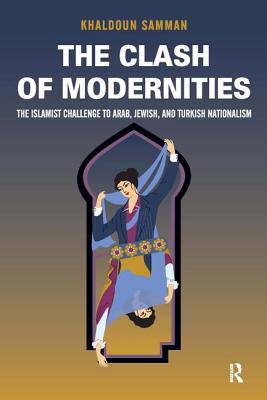
Door een staking bij bpost kan je online bestelling op dit moment iets langer onderweg zijn dan voorzien. Dringend iets nodig? Onze winkels ontvangen jou met open armen!
- Afhalen na 1 uur in een winkel met voorraad
- Gratis thuislevering in België vanaf € 30
- Ruim aanbod met 7 miljoen producten
Door een staking bij bpost kan je online bestelling op dit moment iets langer onderweg zijn dan voorzien. Dringend iets nodig? Onze winkels ontvangen jou met open armen!
- Afhalen na 1 uur in een winkel met voorraad
- Gratis thuislevering in België vanaf € 30
- Ruim aanbod met 7 miljoen producten
Zoeken
Clash of Modernities
The Making and Unmaking of the New Jew, Turk, and Arab and the Islamist Challenge
Khaldoun Samman
Paperback | Engels
€ 37,95
+ 75 punten
Uitvoering
Omschrijving
To understand the Middle East we must also understand how the West produced a temporal narrative of world history in which westemers placed themselves on top and all others below them. In a landmark reinterpretation of Middle Eastern history, this book shows how Arabs, Muslims, Turks, and Jews absorbed, revised, yet remained loyal to this Western vision. Turkish Kemalism and Israeli Zionism, in their efforts to push their people forward, accepted the narrative almost wholeheartedly, eradicating what they perceived as 'archaic' characteristics of their Jewish and Turkish cultures. Arab nationalists negotiated a more culturally schizophrenic approach to appeasing the colonizer's gaze. But so too, Samman argues, did the Islamists who likewise wanted to improve their societies. But in order to modernize, Islamists prescribed the eradication of Western contamination and reintroduced the prophetic stage that they believe - if the colonizer and their local Arab coconspirators hadn't intervened - would have produced true civilization. Samman's account explains why Islamists broke more radically with the colonizer's insult. For all these nationalists gender would be used as the measuring device of how well they did in relation to the colonizer's gaze.
Specificaties
Betrokkenen
- Auteur(s):
- Uitgeverij:
Inhoud
- Aantal bladzijden:
- 272
- Taal:
- Engels
Eigenschappen
- Productcode (EAN):
- 9781594516986
- Verschijningsdatum:
- 1/11/2011
- Uitvoering:
- Paperback
- Formaat:
- Trade paperback (VS)
- Afmetingen:
- 153 mm x 227 mm
- Gewicht:
- 381 g

Alleen bij Standaard Boekhandel
+ 75 punten op je klantenkaart van Standaard Boekhandel
Beoordelingen
We publiceren alleen reviews die voldoen aan de voorwaarden voor reviews. Bekijk onze voorwaarden voor reviews.











